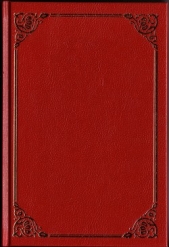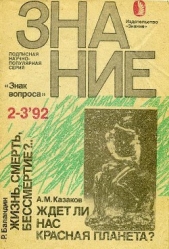Психология критического мышления

Психология критического мышления читать книгу онлайн
Эта книга написана в помощь тем, кто хочет научиться думать современно. Опираясь на новейшие достижения когнитивной психологии и свой уникальный педагогический опыт, Дайана Халперн разработала эффективную программу обучения навыкам «критического мышления». Данная книга может быть широко использована в преподавательской и методической работе, окажет неоценимую помощь в самообразовании, а кроме того, является своеобразным путеводителем по современной когнитивной психологии. Рекомендуется психологам, педагогам, философам, а также всем интересующимся когнитивной психологией, психологией творчества, теорией принятия решений.
Внимание! Книга может содержать контент только для совершеннолетних. Для несовершеннолетних чтение данного контента СТРОГО ЗАПРЕЩЕНО! Если в книге присутствует наличие пропаганды ЛГБТ и другого, запрещенного контента - просьба написать на почту [email protected] для удаления материала
Hains A. A., Hains A. H. (1987). The effects of a cognitive strategy intervention on the problem solving abilities of delinquent youths. Journal of Adolescence, 10,399-413.
Halpern D. F. (1985). The influence of sex role stereotypes on prose recall. Sex Roles, 12, 363-375.
Halpern D. F. (1987a). Analogies as a critical thinking skill. In D. Berger, K. Peydek, W. Banks (Eds.), Applications of cognitive psychology: Computing and education (pp. 75-86). Hillsdale, NJ: Lawrence Erlbaum Associates.
Halpern D. F. (1987b). Thinking across the disciplines: Methods and strategies to promote higher.order thinking in every classroom. In M. Heiman J. Slomianko (Eds.), Thinking skills instruction: Concepts and techniques (pp. 69-76). Washington, DC; National Education Association.
Halpern D. F. (1992). Sex differences in cognitive abilities (2nd ed.). Hillsdale, NJ: Lawrence Erlbaum Associates.
Halpern D. F. (Ed.). (1994). Changing college classrooms: New teaching and learnng strategies for an increasingly complex world. San Francisco: Jossey-Bass.
Halpern D. F. (in press). The skewed logic of The Bell Curve. Skeptic.
Halpern D. F., Blackman S. (1985). Magazines vs. physicians. The influence of information source on intentions to use oral contraceptives. Women and Health, 10, 9-23.
Halpern D. F., Blackman S., Salzman B. (1989). Using statistical risk information to assess oral contraceptive safety. Applied Cognitive Psychology, 3,251-260.
Halpern D. E, Hansen C, Riefer D. (1990). Analogies as an aid to comprehension and memory. Journal of Educational Psychology, 82, 298-305. Halpern D. F., Irwin F. W. (1973). Selection of hypotheses as affected by their preference values. Journal of Experimental Psychology, 101, 105-108. Halpern D. E., Nummedal S. G. (Eds.). (1995). Psychologists teach critical thinking [Special Issue]. Teaching of Psychology, 22. Hanson N. R. (1958). Patterns of discovery. Cambridge,
England: Cambridge University Press. Harman G. (1986). Change in view: Principles of reasoning. Cambridge, MA: MIT Press. Harris R. J. (1977). Comprehension and pragmatic implications in advertising. Journal of Applied Psychology, 62, 603-608. Harris S. B. (1993). The resurrection myth in religion,
science, and science fiction. Skeptic, 2, 50-59. Hasher L., Zacks R. T. (1984). Automatic processing of fundamental information. American Psychologist, 39,1372-1388. Hayes J. R. (1978). Cognitive psychology. Homewood,
IL: Dorsey.
Hayes J. R. (1982). Issues in protocol analysis. In G. R. Ungson D. N. Braunstein (Eds.), Decision making: An interdisciplinary approach. Boston: Kent. Hayes J. R. (1989). Cognitive processes in creativity. In J A. Glover, R. R. Ronning, С R. Reynolds (Eds.), Handbook of creativity (pp. 135-145). New York: Plenum.
Heiman M., Slomianko J. (1986). Critical thinking skills. Washington, DC: National Education Association.
Heller /?., Sattzstein H. D., Caspe W. (1992). Heuristics in medical and non-medical decision-making. The Quarterly Journal of Experimental Psychology, pp. 211-235. HenleM. (1962). On the relation between logic and
thinking. Psychological Review, 69, 366-378. Hennessey B. A., Amabile Т. М. (1987). Creativity and learning. Washington, DC: National Education Association.
Hennessey B. A., Amabile T.M.(988). The conditions of creativity. In R. J. Sternberg (Ed.), The nature of creativity: Contemporary psychological perspectives (pp. 11-38). Cambridge, MA: Cambridge University Press. Herrmann D. J. (1991). Super memory. Emmaus, PA:
Rodale.
Herrmann D. J., Weingartner H., Searleman A., McE-voy C. L. (Eds.). (1992). Memory improvement: Implications/or memory theory. New York: Spring-er-Verlag.
Herrnstein R. J., Murray C. (1994). The bell curve: Intelligence and class structure in American life. New York; The Free Press.
Herrnstein R. J., Nickerson R. S., Sanchez M., Swets J. A. (1986). Teaching thinking skills. American Psychologist, 41, 1279-1289.
Hill P., Bedau H., Checile R., Crochetiere W., Keller-man В ., Dunjian D., Pauker S., Rubin J. (1979).
Making decisions: A multidisciplinary introduction. Reading, MA: Addison-Wesley.
Hitchcock D. (1983). Critical thinking: A guide to evaluating information. Toronto: Methuen.
Hogarth R. M. (1988). Judgment and choice: The psychology of decision (2nd ed.). Chichester, England: Wiley.
Holland J. H., Holy oak K. J., Nisbett R. ?., Thagard P. R. (1986). Induction: Processes of inference, learning, and discovery. Cambridge, MA: MIT Press.
Holley C. D., Dansereau D. F. (1984). Networking: The technique and the empirical evidence. In C. D. Holley D. F. Dansereau (Eds.), Spatial learning strategies: Techniques, applications, and related issues (pp. 81-108). New York: Academic Press.
Holley C. D., Dansereau D. F., McDonald B. A., Garland J. D., Collins K. W. (1979). Evaluation of a hierarchical mapping technique as an aid to prose processing. Contemporary Educational Psychology, 4, 227-237.
Holt J. (1964). How children fail. New York: Dell.
Holt J. (1989). Learning all the time. Reading, MA: Addison-Wesley.
Hostetler A. J. (1988, January). Army eyes novel learning methods. The American Psychological Association Monitor, 19, 7.
Huff D. (1954). How to lie with statistics. New York: Norton.
Hunt E. (1989). Cognitive science: Definition, status, and questions. In M. R. Rosenzweig L. W. Porter (Eds.), Annual review of psychology, 40,603-630.
Hunt M. (1982). The universe within. A new science explores the human mind. New York: Simon : Schustec.
Hutchings P. (1986). Some late night thoughts on teaching creativity. American Association for Higher Educawn, 39, 9-14.
Izawa С (1993). Efficient learning: The total time, exposure duration, frequency, and programming of the study phase. In С Izawa (Ed.), Cognitive psychology applied (pp. 43-78). Hillsdale, NJ: Lawrence Erlbaum Associates.
Izawa C, Hayden R. G. (1993). Race against time: Toward the principle of optimization in learning and retention. In C. Izawa (Ed.), Cognitive psychology applied (pp. 15-42). Hillsdale, NJ: Lawrence Erlbaum Associates.
Jacoby L. L., Kelley С. М., Dywan, J. (1989). Memory attributions. In H. L. Roedinger F. I M. Craik (Eds.), Varietes of memory and consciousness: Essays in honor of Endel Tulving (pp. 391 -422). Hillsdale, NJ: Lawrence Erlbaum Associates.
James W. (1890). The principles of psychology New York: Holt.
Janis I. L. (1989). Crucial decisions: Leadership in policy making and crisis management. New York: The Free Press.
Janis I. L., Mann L. (1977). Decision making: A psychological analysis of conflict, choice and commitment. New York: The Free Press.
Jason G. (1987). Are fallacies common? A look at two debates. Informal Logic, 8, 81-92.
Jensen A. R. (1980). Bias in mental testing. New York: The Free Press.
Jensen A. R. (1981). Straight talk about mental tests. New York: The Free Press.
Johnson M. K., Raye C. L. (1981). Reality monitoring. Psychological Review, 88,67-85.
Johnson-Laird P. N… Byrric R. M. J. (1991). Deduction. Hillsdale, NJ: Lawrence Erlbaum Associates.
Johnson-Laird P. N… Legrenzi P., Legrenzi M. (1972). Reasoning and a sense of reality. British Journal of Psychology. 63, 395-400.
Johnson-Laird P. N., Wason P. C. (1970). A theoretical analysis of insight into a reasoning task. Cognitive Psychology, 1, 134-148.

























